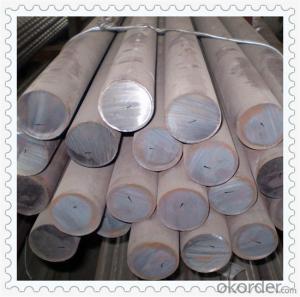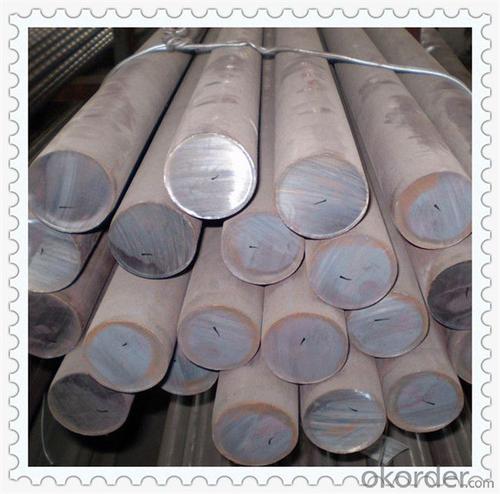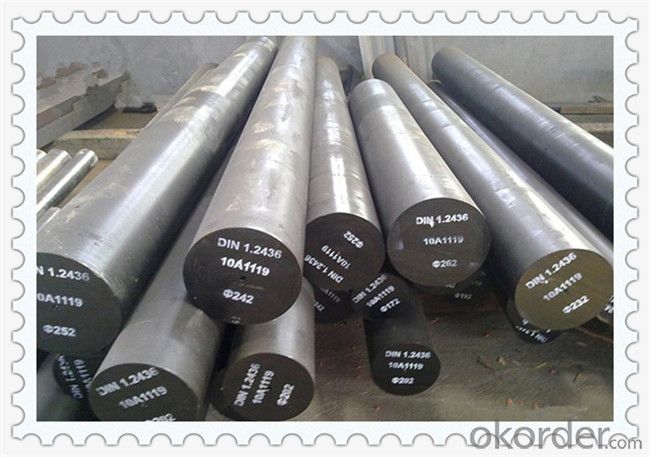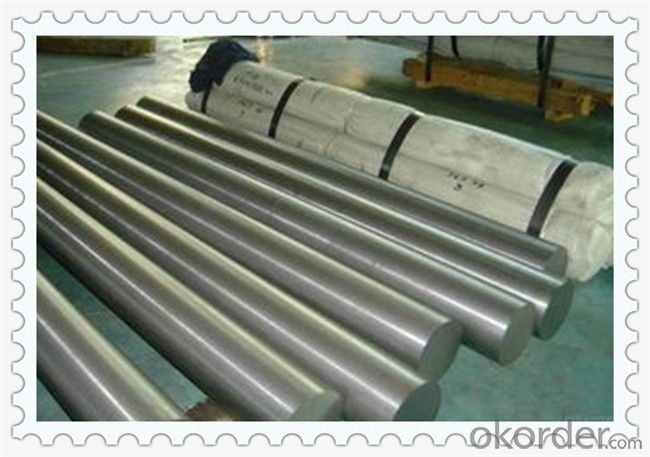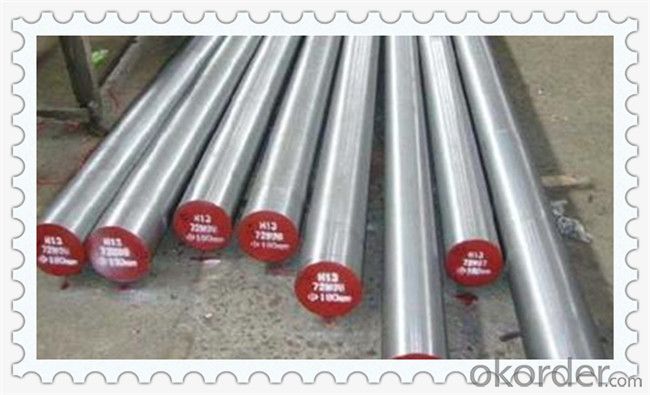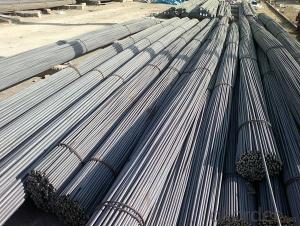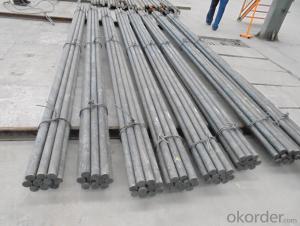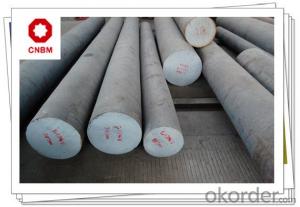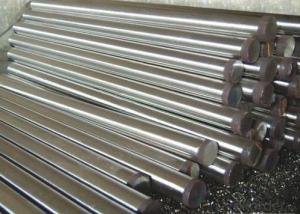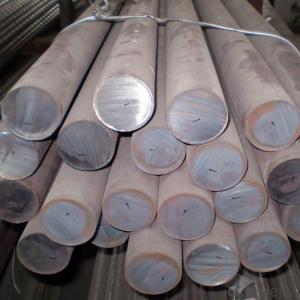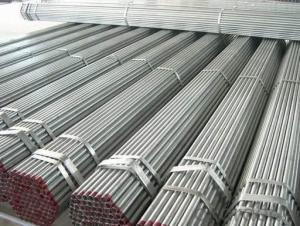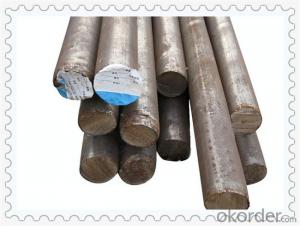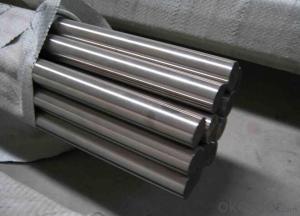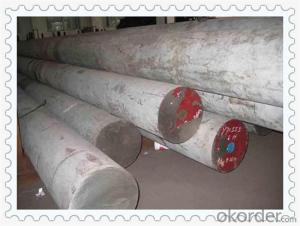Alloy Steel Round Bars 41Cr4
- Loading Port:
- China main port
- Payment Terms:
- TT OR LC
- Min Order Qty:
- 50 m.t.
- Supply Capability:
- 10000 m.t./month
OKorder Service Pledge
OKorder Financial Service
You Might Also Like
Alloy Steel Round Bars 41Cr4
Product Details
1. Sizes information
Diameter:10-310mm
Length:can be required to any sizes. (Commenly from 4m-6m)
Length tolerange:+/-100mm(max)
Straightness:3mm/m(max)
2.
Standard | DIN EN 10083-1 | ||||||||||
Grade | 41Cr4 | ||||||||||
MOQ | 25 Metric Ton | ||||||||||
Diameter | 8mm~1500mm | ||||||||||
Length | 6m,12m or as required. | ||||||||||
Diameter Tolerance | As required | ||||||||||
Condition of delivery | Hot rolled,Cold Rolled or as required. | ||||||||||
3. Mechanical Properties
| Grade | Tensile Strength (Mpa) | Yield Strength (Mpa) | Elongation (%) | Reduction of Area (%) | Charpy Impact (J) | Hardness (HB) |
| 35cd4 | ≥980 | ≥785 | ≥9 | ≥45 | ≥47 | ≤207 |
4. Chemical composition
| Grade | C | Cr | Si | Mn | P | S | Ni | Cu |
| 41Cr4 | 0.37-0.44 | 0.80-1.10 | 0.17-0.37 | 0.50-0.80 | ≤0.035 | ≤0.035 | ≤0.30 | ≤0.30 |
Products Show
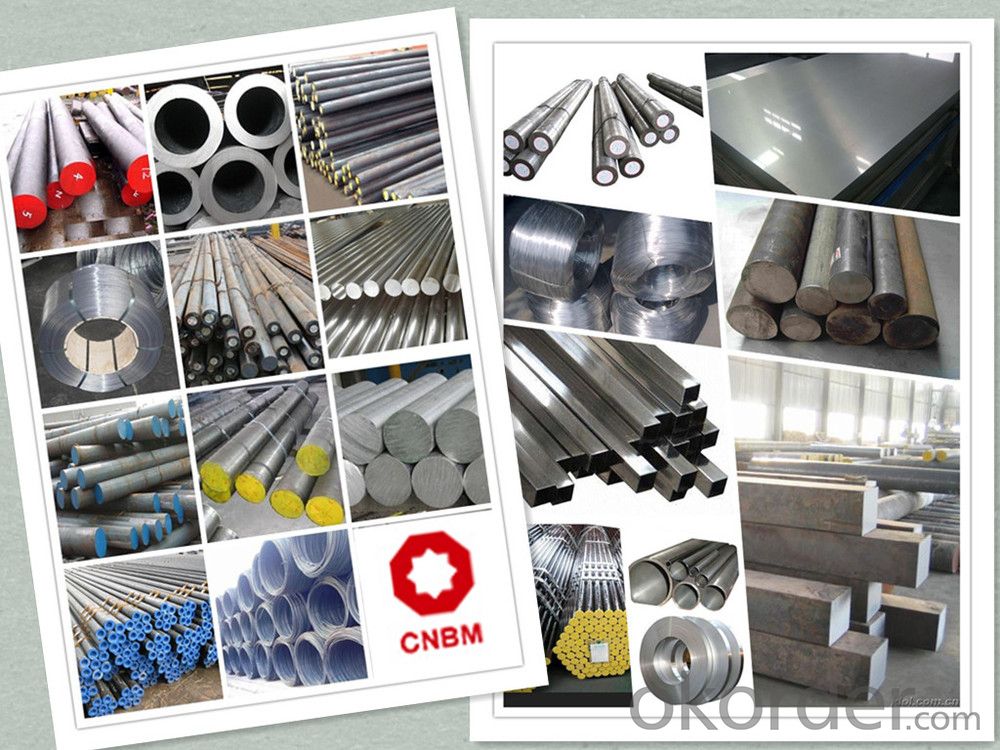
Product Overviews
| Product Name | Typical Grades | Diameter(mm) | Standard adopted |
| Carbon Steel | 20 (1020/S20C/C22) | Ø16-Ø300 |
GB/SAE/JIS/DIN
|
| 40 (1040/S40C/C40) | |||
| 45 (1045/S45C/C45) | |||
| Bearing Steel | GCr9 (51100/SUJ1) | Ø12-Ø250 | |
| GCr15 (52100/SUJ2/100Gr6) | |||
| GCr9SiMn (A485-Gr.1/SUJ3) | |||
Cr-Mo Steel | 20Cr (5120/SCr420H/20Cr4) | Ø12-Ø250 | |
| 40Cr (5140/SCr440/41Cr4) | |||
| 42CrMo(4140/SCM440/42CrMo4) | |||
| Gear Steel | 20CrNiMo | Ø16-Ø600 | |
| 20CrMn(5115/SMnC420/20MnCr5) | |||
| 20CrNiMo(8620/SNCM220/20CrMiMo2) |
Application
| Carbon Steel | Mold bottom, Plastic mold, Construction machinery parts Automobile parts, Security grills, Screens, Construction |
| Bearing Steel | Aerospace, Navigation, Nuclear energy, Chemical industry Electronic information, Petrochemical, Instrument and meter Transportation |
| Cr-Mo Steel | Mechanism & Fasteners gear, Stressed components for vehicles Engines and machines, Parts of larger cross-section |
| Gear Steel | All kinds of gears, Statically and dynamically stressed component for vehicles Engines and machine, Larger cross-section parts, Crankshafts |
Work Shop
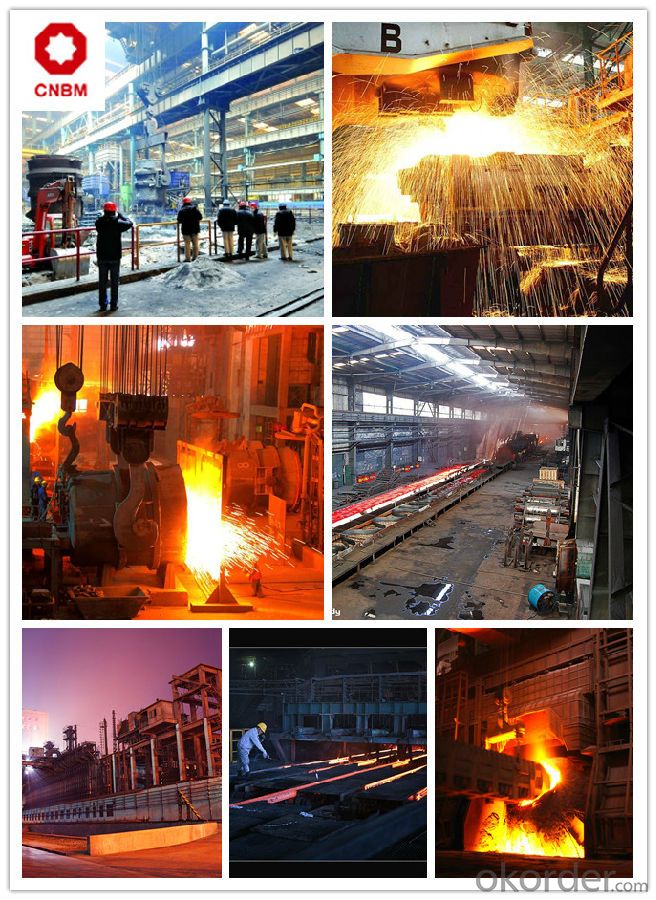
Company Information
CNBM International Corporation is the most important trading platform of CNBM group.
Whith its advantages, CNBM International are mainly concentrate on Cement, Glass, Iron and Steel, Ceramics industries and devotes herself for supplying high qulity series of refractories as well as technical consultancies and logistics solutions.

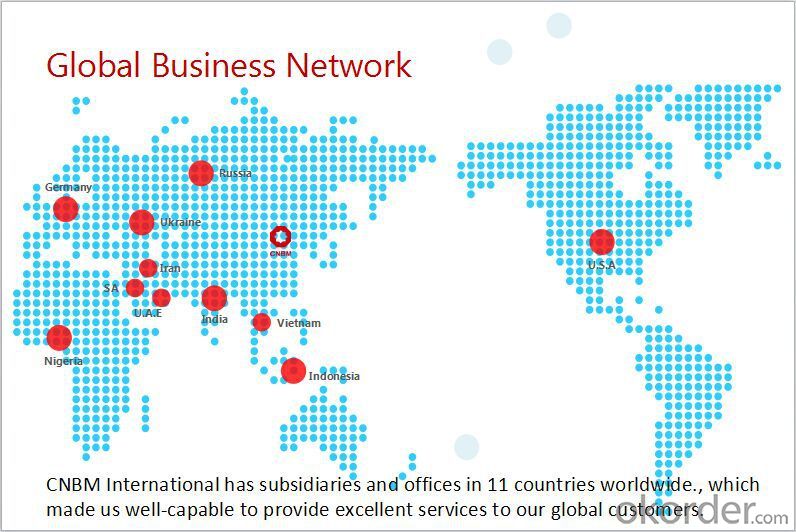
FAQ
1, Your advantages?
professional products inquiry, products knowledge train (for agents), smooth goods delivery, excellent customer solution proposale
2, Test & Certificate?
SGS test is available, customer inspection before shipping is welcome, third party inspection is no problem
3, Factory or Trading Company?
CNBM is a trading company but we have so many protocol factories and CNBM works as a trading department of these factories. Also CNBM is the holding company of many factories.
4, Payment Terms?
30% TT as deposit and 70% before delivery.
Irrevocable L/C at sight.
5, Trading Terms?
EXW, FOB, CIF, FFR, CNF
6, After-sale Service?
CNBM provides the services and support you need for every step of our cooperation. We're the business partner you can trust.
For any problem, please kindly contact us at any your convenient time.
We'll reply you in our first priority within 24 hours.
Packaging & Delivery
1, Packaging: seaworthy package or as required
2, Delivery: 35-45 days or based on quantity
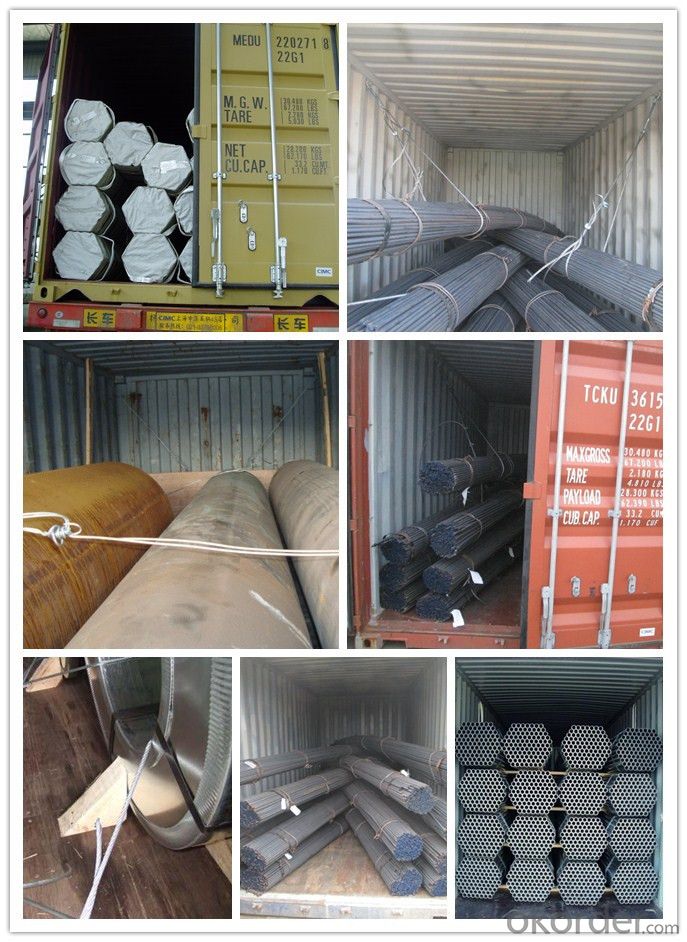
- Q: What is the difference between a hot rolled and a turned steel round bar?
- The main difference between a hot rolled and a turned steel round bar lies in the manufacturing process and the resulting characteristics of the finished product. A hot rolled steel round bar is produced by heating a billet or ingot of steel to a high temperature and then rolling it into the desired shape. This process allows for the steel to be formed and shaped easily, resulting in a bar with a rough surface and a slightly rounded or irregular shape. Hot rolling also helps to improve the overall strength and toughness of the steel, making it suitable for a wide range of applications. On the other hand, a turned steel round bar is produced by machining a hot rolled or cold drawn bar on a lathe. This process involves removing material from the surface of the bar using cutting tools, resulting in a smooth and precise finish. Turning also allows for greater dimensional accuracy and control over the final shape and size of the bar. In terms of surface finish and dimensional accuracy, a turned steel round bar generally offers a higher level of precision compared to a hot rolled bar. The turned bar has a smoother surface with fewer imperfections, making it ideal for applications where appearance and aesthetics are important. Additionally, the turned bar typically has tighter tolerances, ensuring consistent dimensions throughout its length. The choice between a hot rolled and a turned steel round bar depends on the specific requirements of the application. Hot rolled bars are commonly used in construction, manufacturing, and general engineering applications where strength and toughness are crucial. Turned bars, on the other hand, are often used in industries such as automotive, aerospace, and precision machining, where a high level of surface finish and dimensional accuracy is required. In summary, the difference between a hot rolled and a turned steel round bar lies in the manufacturing process and the resulting characteristics. Hot rolled bars offer strength and toughness, while turned bars provide a smoother surface finish and greater dimensional accuracy. The choice depends on the specific needs of the application.
- Q: What are the different types of steel round bars used in the defense industry?
- There are various types of steel round bars used in the defense industry, including but not limited to carbon steel, alloy steel, stainless steel, and tool steel. Each type has specific properties that make them suitable for different applications within the defense sector.
- Q: How do you prevent steel round bars from rusting during storage?
- To prevent steel round bars from rusting during storage, there are several measures you can take: 1. Keep the round bars in a dry environment: Moisture is one of the main causes of rust. Ensure that the storage area is dry, free from any leaks or humidity. Consider using dehumidifiers or moisture-absorbing products to maintain the dryness. 2. Apply a rust inhibitor: Coating the steel round bars with a rust inhibitor can provide a protective layer against moisture and oxygen, preventing rust formation. Rust inhibitors are available in various forms, such as sprays, oils, or waxes. Apply the inhibitor following the manufacturer's instructions. 3. Store in a climate-controlled area: Extreme temperature fluctuations can cause condensation, leading to rust formation. Storing the round bars in a climate-controlled area with a consistent temperature can minimize the risk of rusting. 4. Properly package the round bars: Use appropriate packaging materials to protect the steel round bars from direct contact with moisture or other contaminants. Consider wrapping them in plastic or using moisture-resistant packaging materials. 5. Regularly inspect and maintain: Periodically inspect the stored round bars for any signs of rust or damage. If any rust spots are detected, promptly clean and reapply a rust inhibitor to prevent further corrosion. Remember, prevention is key when it comes to avoiding rust on steel round bars during storage. By implementing these measures, you can significantly reduce the risk of rust formation and maintain the quality of the round bars.
- Q: Can steel round bars be used in the manufacturing of gears?
- Yes, steel round bars can be used in the manufacturing of gears. Steel round bars are commonly used in gear manufacturing due to their high strength, durability, and resistance to wear and tear. The round shape of the bar allows for easy machining and shaping into the desired gear design. Steel round bars also have excellent mechanical properties, such as high tensile strength and good fatigue resistance, which are essential for gears that experience heavy loads and repetitive motions. Additionally, steel round bars can be heat-treated to further enhance their hardness and toughness, making them suitable for demanding gear applications. Overall, steel round bars are a popular choice in gear manufacturing due to their versatility and reliability.
- Q: Can steel round bars be used for making agricultural equipment?
- Yes, steel round bars can be used for making agricultural equipment. Steel is a strong and durable material that can withstand heavy use and provide the necessary strength and stability required for agricultural equipment.
- Q: Can steel round bars be used in the manufacturing of agricultural equipment?
- Yes, steel round bars can be used in the manufacturing of agricultural equipment. Steel is a strong and durable material that provides the necessary strength and structural integrity required for agricultural machinery. It is commonly used in the production of components such as axles, shafts, and supports, making it suitable for various types of farming equipment.
- Q: What kind of steel bars are used in general civil buildings?
- In the general construction of commonly used hot rolled round bar (commonly known as round steel), hot rolled ribbed steel bars (commonly known as steel), the two most widely used steel. Identified as HPB235, the diameter of 6.5, 8, 10, 12, and then rough is not commonly used, and in the 6.5 and 8 most as commonly used, used as column, main reinforcement and stirrups and plate reinforced beam distribution.Steel is the HRB335, the diameter of 12 to 22, 25, 28, even 32, and then rough generally appear in the mass concrete construction, not commonly used, generally below 25 is commonly used in masonry structure in rural low level below 16 is most commonly used. Used as beams, columns, main bars and stand bars, etc.
- Q: How are steel round bars used in the manufacturing of agricultural machinery?
- Steel round bars are commonly used in the manufacturing of agricultural machinery as they provide strength, durability, and flexibility. These bars are often used to construct various components such as axles, shafts, and pins, which play a crucial role in supporting and transmitting power within the machinery. The high tensile strength of steel round bars allows them to handle heavy loads and withstand harsh operating conditions, ensuring the reliability and longevity of the agricultural equipment.
- Q: How do steel round bars perform under impact or shock loading?
- Steel round bars are known for their exceptional performance under impact or shock loading. Due to their high strength and toughness, steel round bars can withstand sudden forces and resist deformation or failure. The inherent properties of steel, such as its hardness and ductility, contribute to its ability to absorb energy and distribute it throughout the material, minimizing the impact on the structure. When subjected to impact or shock loading, steel round bars undergo plastic deformation, which allows them to absorb the applied energy without breaking. The ability to absorb energy is crucial in various applications, such as construction, automotive, and machinery industries, where components are often subjected to dynamic loads. Additionally, steel's excellent fatigue resistance further enhances its performance under impact or shock loading. Even when subjected to repeated impacts, steel round bars can withstand the cyclic loading without undergoing significant degradation in their mechanical properties. Moreover, steel round bars can be further enhanced through various heat treatment processes, such as quenching and tempering, to improve their resistance to impact or shock loading. These processes help to refine the microstructure of the steel, resulting in increased strength, toughness, and hardness. In conclusion, steel round bars have a remarkable performance under impact or shock loading. Their high strength, toughness, and ability to absorb energy make them reliable and widely used in applications where sudden forces or dynamic loads are expected.
- Q: What are the different treatments available for steel round bars?
- There are several different treatments available for steel round bars, including heat treatment, surface treatment, and coating. Heat treatment involves processes such as annealing, quenching, and tempering to improve the material's strength, hardness, and ductility. Surface treatments, such as polishing, grinding, or shot blasting, are used to enhance the surface finish and remove any imperfections. Coatings, such as galvanizing or painting, provide protection against corrosion and improve the overall appearance of the steel round bars.
Send your message to us
Alloy Steel Round Bars 41Cr4
- Loading Port:
- China main port
- Payment Terms:
- TT OR LC
- Min Order Qty:
- 50 m.t.
- Supply Capability:
- 10000 m.t./month
OKorder Service Pledge
OKorder Financial Service
Similar products
Hot products
Hot Searches
Related keywords
